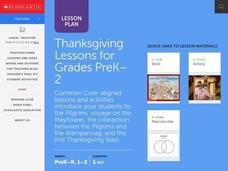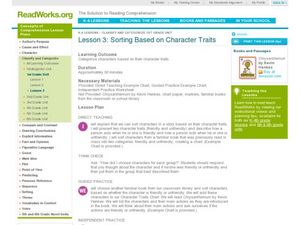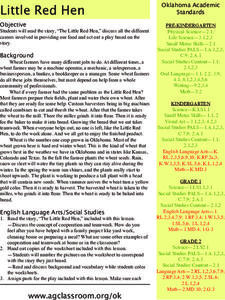Learning to Give
Humphrey The Lost Whale
The children's book Humphrey the Lost Whale tells an amazing tale of a community joining together for a common cause. Read this book with your class, making connections between the events in the story and personal experiences of...
Harper Collins
If You Give...Series Teaching Guide
If you give teachers a few good ideas, they can really bring a story to life. Included in this resource are dozens of activities to use as your class reads books in the If You Give... series. From holding puppet shows and creating...
Curated OER
Lesson 2: Feelings
After reading the story, David, No! and creating a chart of David's feelings, youngsters discuss how they knew how he felt throughout the story. They discuss using prior knowledge and picture clues to determine how the main...
Curated OER
Identifying Story Elements
Help your class identify story elements. They will discuss character, setting, problem, and solution after reading a story. A graphic organizer will help them to identify various elements with guided practice and independent practice...
Curated OER
The Rule of Three
What makes a fairy tale a fairy tale? Teach young readers one characteristic that defines the fairy tale genre. They'll learn that events, objects and characters in fairy tales often occur in threes. They read Goldilocks and the Three...
Curated OER
Lesson 3: Character Values
A value is something a person or character thinks is right or good; it's also a characteristic of a fairy tale. Learners discuss how fairy tale characters often have or exemplify a specific value. They compare the values found in The...
Curated OER
Lesson 1: Plot Problems
Add another characteristic to your class characteristics of fairy tales chart. First they discuss the concept of problems or conflicts found in most fairy tale plots then they practice identifying conflict as they read. They read...
Curated OER
Lesson 3: Looks, Actions, and Feelings
Remember that boy David from the David, No! books? He's back, and youngsters draw a picture of him from a scene in the book David Goes to School. They write a sentence describing his appearance, actions, and feelings...
Curated OER
Identifying When Using Evidence from the Text
First listen to the story The Meanest Thing to Say and then answer question regarding when the story takes place. Using evidence from the text, text clues and pictures to order events and find the time frame of the story is what this...
Curated OER
Oklahoma Stone Soup
Class members complete activities related to the story "Oklahoma Stone Soup." First, pupils read, discuss, and answer questions about the story. Next, to incorporate math into the lesson, learners make stone soup using a variety of...
Scholastic
Thanksgiving Lessons Grades PreK-2
A quintessential resource for teaching an elementary unit on the first Thanksgiving addresses a variety of skills, including informational reading, critical thinking, comparing and contrasting facts, technology tools, and historical...
Curated OER
Picture Fists Full of Kisses
Ease children's back-to-school jitters with this primary grade lesson based on the book The Kissing Hand by Ruth E. Harper. Starting off with a singing of the song "I Wish I Had a Little Red Box", children go on to discuss and...
Curated OER
Lesson 1: Actions
Action is what characters in books do or say. Little ones discuss what actions are and then examine the book David, No! to identify them. As they read through the book, they chart all of David's actions. They write a sentence and draw a...
Curated OER
Lesson 3: Gods and Goddesses
Exploring and characterizing myths can be fun. The class reads a version of "Pandora's Box," add to their myth chart, and discuss how gods and goddesses are commonly used in mythology. They work in groups to identify the gods and...
Curated OER
Sorting Based on Character Traits
Characters from a story can be sorted by their traits, just like shapes or objects can. First the children list several character traits on a chart, they read a familiar story, and then sort the characters by their friendly or unfriendly...
Curated OER
Lesson 3: Comparing and Contrasting two Characters from a Book
One book, two main characters, and a Venn diagram; it's time to discuss similarities and differences in order to compare and contrast two characters from the same book. The class listens to the book Toot and Puddles as they complete a...
Curated OER
Agriculture in Motion
Youngsters learn about simple machines that could be used on a farm. They learn about agricluture, listen to a farmer speak, compare and contrast different farm machines, and then design their own. Note that although the publisher...
Curated OER
Little Red Hen
Pupils listen to a teacher reading of The Little Red Hen, identify the story elements and sequence them. They talk about different jobs associated with providing food and act out a play based on the story. Be aware that although several...
PBS
Pbs Teachers: Story Writing With Arthur
This series of 12 downloadable activities teach students some basics of story writing, using books or videos from the PBS "Arthur" series as a springboard. Activities include creating story maps, asking questions about characters and...
Annenberg Foundation
Annenberg Learner: Interactives: Elements of a Story
Explore the elements of a story using the well-known Cinderella story as source material. Learn about setting, character, sequence, exposition, conflict, climax, and resolution.
Read Works
Read Works: Passages:
[Free Registration/Login Required] Students read a fiction text about a little girl named Jen who got a surprise message from her grandma and answer questions about comprehension, main idea, and inferences. Links to a paired text and...
Better Lesson
Better Lesson: Come Along Daisy
Students will engage in discussions about story details and write an informational piece about the events in the story "Come Along Daisy".
Read Works
Read Works: Lesson: Author's Purpose: Cause and Effect Signal Words
[Free Registration/Login Required] With this lesson plan, students can learn how several authors can write about the same topic, but for different purposes.
Better Lesson
Better Lesson: Day 1 Rude Giants
Students will use illustrations and details in a story to describe its characters, setting, and events by working with partners to ask and answer questions about the text.

























